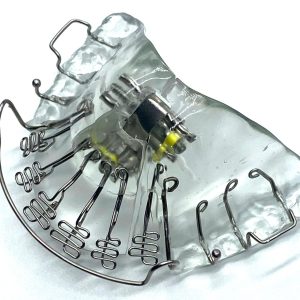The DNA is an oral appliance owned by Vivos.com. The Vivos appliance is an adult palatal expander used to treat adults who clench their teeth, have TMJ pain, and sleep apnea. Most candidates have either crooked teeth, tied tongues, bad posture, mouth breathing habits or all of the above. The Vivos expander slowly changes the shape of the jaws by stimulating new growth in the jaw bones. In the DNA appliance before and after picture below, notice the increase in width of the upper jaw and how much taller and more forward the jaw and facial structures grew. More space improves airflow and breathing, and teeth alignment.
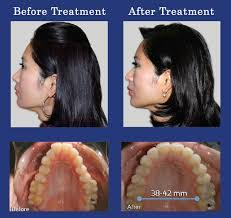
The DNA appliance is effective in treating
- gummy smile
- stop mouth breathing
- obstructive sleep apnea
- poor facial profile – correct reverse jaw position, widen the palate
- facial and jaw asymmetry
- forward head posture and overall posture
DNA appliance Treatment video

Contact Dr. Adams for a Consultation and 3D Xray
Myofunctional Therapy and Tongue Ties
The DNA appliance treatment only corrects the structure of the jaws. For functional improvements to mouth breathing, TMJ and sleep apnea, tongue ties, lip ties and myofunctional therapy treatments will need to be done. See below for more information.
DNA appliance compared to Sleep Apnea Surgery?
- UP3 surgery (UPPP or Uvulopalatopharyngoplasty)
- Genioglossal advancement surgery (Tongue advancement surgery)
- Pillar implants or rigid polyester implants inserted into the soft palate to prevent it from flapping around during snoring
Dr. Adams recommends trying non-surgical procedures before going into sleep apnea surgeries. The DNA is capable of growing the jaw structures forward (upper and lower jaws i.e., the maxilla and mandible.) Forward or anterior growth produces the same effect as tongue advancement surgery with the additional benefit of increasing the volume of the mouth and expanding the palate. In this way the DNA corrects to root cause of sleep apnea whereas the sleep apnea surgeries ties the tongue and hyoid bone upwards and forward. The UP3s surgery clears some flabby tissue in the throat but the DNA appliance tones this tissue and can tighten it up.
The DNA Appliance Looks Like a Retainer?
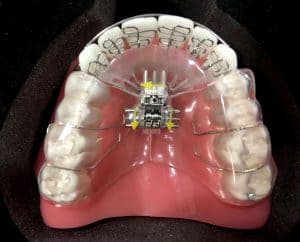
The DNA appliance resembles a retainer and is comfortable to wear. It is worn for approximately 10-12 hours at night. The Vivos device was originally developed by Dr. Singh and later sold to Vivos. Treatment usually lasts 12 – 24 months but in some cases can take up to 2 years. The DNA alleviates TMJ pain and usually eliminates the need for daily night guards, bite splints, and CPAP.
DNA Appliance Costs?
The DNA Appliance Cost is between $8000 and $13,000. The exact cost depends on the complexity of the case and the skill of the Vivos dentist. In some cases the DNA provider may charge separately for the appliance and all the adjustment visits and X-rays, etc. Getting the DNA Appliance for a flat cost upfront is better because the total cost of treatment is known upfront. Otherwise separate fees will be charged for all the visits, x-rays, adjustments and anything else that may come up.
DNA Device vs MSE Expander and MARPE
MSE stands for maxillary skeletal expander. MARPE is mini-implant assisted rapid palatal expander. MSE and MARPE are forms of palatal expansion that happens by putting expansion force directly on the the maxillary bone. The DNA appliance places force directly on the teeth. The DNA appliance is called a tooth borne expander whereas MSE is called bone borne. Both forms of expansion are effective but they have pros and cons.
The DNA appliance is capable of changing the upper and lower jaws in all three dimensions of space. MSE and MARPE only make the upper jaw expand wider. MSE and MARPE usually are part of a course of treatment involving other appliances or surgery including braces and possibly lower jaw surgery.
Dr. Adams recommends starting with the DNA or Homeoblock appliances. Very often the DNA and Homeoblock appliances can complete a TMJ or Sleep apnea case without the need for surgery. We also do surgery and we work with ENT doctors.
How Often Does the Vivos Appliance get Adjusted?
Turning or expanding the Vivos appliance too often will result in the expander being too tight and causing tooth tenderness and pain. How and when to adjust the DNA appliance. The appliance should be adjusted only when it is passive and loose after the last turn. The DNA expander will get expanded every 2-3 weeks on the average for most adults. Adjusting the appliance any faster will result in gum recession and unwanted tooth movement. If the DNA expander should never cause pain of feel “too tight.” The Vivos will produce 80% bone growth if it is adjusted and there is not pain or pressure. If it feels like tightened braces, than it is to tight. The #1 cause of poor treatment outcome is tuning the appliance too often while it is too tight. Also if the appliance is not worn 10+ hours a day there will not be enough time for bone growth and the appliance will move the teeth.
DNA Appliance Cleaning and Maintenance
How to clean the DNA appliance? Immediately brush the Homeoblock or DNA appliance with moderate pressure using a high power electric tooth brush such as a Sonicare or Oral B professional. Be sure to clean the springs, expansion mechanisms and the entire surface of the appliances. It is not advisable to use tooth paste. Baking soda or fine pumice can be used but is not necessary. Plaque and other minerals are very easy to clean just after the appliance is removed from the mouth.
What does DNA Appliance Stand For?
“Daytime and Night time Appliance.” But oddly the appliance is usually only worn at night. The appliance needs to be worn 10-12 hours. Most people put the DNA in after dinner and wear it through the night. The DNA appliance was invented by Dr. Dave Singh. Singh called the appliance therapy “epigenetic orthodontics and pneumopedics.” The DNA is very similar to the Homeoblock appliance in design. The Homeoblock was invented by Dr. Theodore Belfor several years before the DNA appliance. Dr. Belfor was Dr. Singh’s mentor for several years. Many dentists still prefer the Homeolock to the DNA, but it is just a personal preference because both appliances can really do the same things with the same design.
The TMJ Sleep and Breathe Center
Dr Gary Adams and Dr Viet Le welcome you to The TMJ Sleep and Breathe Center. Adult Expanders can permanently correct the root cause of many TMJ problems and sleep disorders. Our unique practice combines the benefits of orthodontic expanders, chiropractic services, breathing exercises and myofunctional or tongue correction therapy. Our treatments will help people smile, bite, breathe, sleep and posture better. We are located in Vienna Virginia near Tysons Corner and just outside Washington DC.
TMJ Sleep and Breathe Center uses a holistic approach to treating the root cause of TMJ and airway problems. Long term stability and success of treatment depends on correcting the cause and relieving symptoms. As great as the DNA appliance is, it is only one piece to the puzzle. It focuses on structural problems, but there is much more to it.
Goals of DNA Appliance Treatment:
- Eliminate the cause of TMJ pain and headaches
- Establish healthy breathing patterns
- Correct Mouth Breathing
- Stop teeth clenching
- Decrease airway resistance
- Balance the occlusion
- Increase deep sleep
- Improve posture
- Correct upper and lower jaw relationships
- Correct tongue function
Notice in the picture below how the jaw and facial structure grew taller and more forward. Notice the change in shape of the neck and correction of forward head posture. Head and neck posture is corrected when the lower jaw is able to grow down and forward.
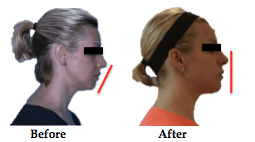
How the DNA Expander Works
The DNA expands the upper jaw and balances how the teeth fit together and bite at the same time. The device is unique in that it treats TMJ and occlusion at the same as it improves the airway. During orthodontic expansion, the jaws grow three dimensionally to be wider, taller and more forward. A tremendous amount of new room is created in the dental arches, mouth and nasal passageways. The growth of the mouth and nasal passageways has obvious advantages in decreasing upper airway resistance. As the maxilla (upper jaw) grows wider, the mandible (lower jaw) also has more room to move forward into a more optimal position. Moving the the lower jaw forward established more space between the tongue and the throat. Forward repositioning of the mandible is how we solve poor facial profile and “retrognathia.”
Video About How DNA Appliances Work

Vivos Appliance compared to Night Guards
The Vivos appliance is removable and easy to tolerate. It is worn for a total of 10-12 hours only and not during the day. At the termination of Vivos therapy the appliance is not worn anymore. The difference between the DNA and night guards is the DNA corrects the root cause of TMJ and airway problems. Night and snore guards manage the problem and need to be worn indefinitely.
What Causes Teeth Clenching?
Roughly 80% of people who have bruxism and clench their teeth at night have airway resistance and sleep problems? Poor sleep is one of the leading causes of thyroid and metabolic problems. Many of our patients stop taking synthroid and other thyroid drugs after therapy. Heart disease and premature aging are also caused by poor sleep. Getting up in the middle of the night to urinate is a sign of high blood pressure. Better breathing patterns during sleep, reduces blood pressure and night time urination. Some of the nagging benefits of our treatments are easy to realize, but improving overall health is also a very important treatment goal.
DNA Appliance Treatment Process and Protocol
- The Vivos expander is worn at night for 10 hours
- Simple adjustments made by patient every 2-3 weeks
- evaluations at our office every 3-4 months
- Average treatment time is 12-24 months
- The DNA device is worn as a retainer for 1-2 months
- Treatment is complete
Myofunctional Therapy

What is a tongue tie?
It is a tight fiber that attaches the tongue to the front part of the lower jaw bone. Ankyloglossia is the medical term for tied tongue. The presence or absence of a tongue tie is not what is important. How well the tongue functions and moves is what matters. Tongue muscle tone, strength and range of motion are critical. Healthy swallow pattern. Can the tongue easily lift up into the palate and create an air-tight seal? Does the tongue have a wide shape and good tone during movement? Or does it get pointy and curl down when it is pushed out of the mouth?
Problems Caused by Tongue Tie
Tied tongues do not move well. Tongue pressure during talking, swallowing and eating stimulates spacious development of the mouth, nose and face at a very young age. If the tongue cannot move well, the jaws and face will not grow large enough for healthy breathing patterns. People will have small breathing passageways. They will get choked by a large tongue especially during sleep. The tongue is the root cause of mouth breathing, airway resistance, snoring and many sleep problems.
What is Myofunctional Therapy?
Myofunctional therapy is basically physical therapy for tongues. Tongue function is evaluated. Exercises are given to improve tongue:
- Range of motion
- Strength and muscle tone
- Swallow patterns
- Formation of a seal on the palate
- Participation during healthy breathing patterns
When a tongue tie causes the tongue not to function properly, a qualified dentist and myofunctional therapist will order a functional tongue untie procedure. A functional procedure verifies the tongue can move properly during the surgical procedure. Laser assisted techniques are done quickly, painlessly and without any bleeding. Success of the procedure hinges on the the tongue being untied and the patient performing myofunctional tongue exercises after the procedure.
Is the DNA appliance an Orthotropic treatment?
It basically is an Orthotropic appliance as it works, but it is not endorsed by Dr. John or Mike Mew. Dr. Mike Mew coined the term Mewing which is basically a form of myofunctional therapy. Dr. Mew is very fond of the Biobloc appliance.
Healthy Breathing Patterns
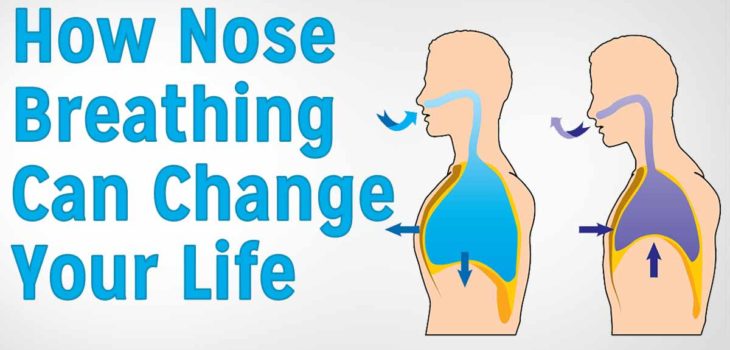
Mouth Breathing vs Nose Breathing
Nasal breathing promotes healthy growth and development starting at a very young age. Nose breathing uses muscle groups in the abdomen, ribs, shoulders, neck and face. Healthy coordinated muscle patterns during breathing support good upright comfortable posture.
Mouth breathing uses a different muscle pattern than nasal breathing. Mouth breathing causes people to slouch and have forward head posture. People who mouth breath end up with small jaws, crooked teeth, poor airways, bad posture, sleep problems and bruxism. This is because muscle patterns used during mouth breathing causes the bones in the face, chest, back and neck to grow to be the wrong size and shape. Muscle pressure stimulates our bones to grow to a certain size and shape.
The tongue puts pressure on the upper jaw and teeth. The pressure promotes growth of a wider palate wider palate and upper jaw. The hard palate forms the base of the nose. As the palate grows wider, people can fit more air through larger nasal spaces. If enough oxygen fits through nasal spaces, it is not necessary to open the mouth to breathe. If the nasal passageways are too small, the mouth will need to open to meet oxygen demands.
Chiropractic Services – Posture Restoration
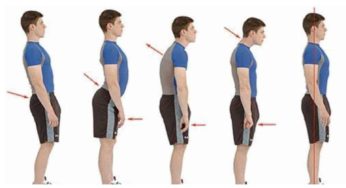
Many of our patients go back and forth between the dentist and the chiropractor complaining about pain. There is a profound link between bad posture and airway obstruction disorders. The Dentist usually hears about teeth clenching, TMJ and headaches. The chiropractor gets complaints about neck and back pain. The root cause of all this pain is poor skeletal development at a young age. People use the wrong muscles patterns to breathe when mouth breathing. Also, when breathing is restricted, different muscles need to be used in a more forceful way. The unhealthy muscle pressure literally causes the bones in the head, neck and back to grow to be the wrong size and shape for good posture. Over time, the body fatiques from performing with less than optimally shaped posture and function.
Why DNA Appliance Expansion is not more common
- Lack of education. Most professionals are not educated about the link between sleep apnea, bruxism and TMD problems.
- DNA treatment is a very specialized area of practice. Success also requires a multi-disciplinary approach including specially trained dentists, chiropractors and sometimes ENT and sleep doctors. For that reason there are very few providers. The treatment has lots of proven research and some FDA clearances for correction of sleep apnea. We hope this treatment will become better known, so more people can get the help they need.
TMJ and Bruxism are Signs of Sleep Apnea
TMJ symptoms are caused by teeth clenching while asleep. Many people do not even know they are clenching and bruxing. Clenching occurs when the airway is partially blocked by the tongue and sometimes tonsils and other tissues during deep sleep. Clenching is a reflex caused by the upper airway being closed or blocked. Often times the obstruction is the tongue falling into the airway during deep sleep. Clenching is a defense reflex that wakes you up into a lighter sleep, so you can get enough oxygen.
Why the Tongue Blocks the Airway During Sleep
- Inadequate space in the mouth for the tongue to fit without being squished between teeth.
- Tongue posture too low and far back in the mouth near the airway.
How the DNA Expanders Creates More Tongue Space
- Creates forward growth of the lower jaw so the tongue is further away from the airway
- Increases space between the teeth by widening and balancing the space between the teeth.
- Jaw and facial structures grow forward, wider and taller. This creates a lot more volume in the mouth and dramatically improves space air flow
- The upper jaw grows wider. The upper jaw is the base of the nose, so the nasal bone actually grows wider. Nasal breathing is improved. Breathing should be in through the nose and out through the mouth or nose.
Vivos Dentist Integrated Practice Program
Dr. Adams is a certified Vivos appliance provider. The capacity for orthodontic expander appliances to grow adult jaws and faces is called pneumopedics and craniofacial epigenetics. The confusing term is not important, but what it refers to is new jaw and cranial bone growth in an adults. There is not a consensus in the dental and medical community about this area of therapy, but many doctors are using the modality and it does work.
More recently pneumodedics has become more popular. Approximately 4 years ago, Vivos purchased the DNA appliance from Dr. Singh. Vivos invested lots of money into promoting the DNA appliance and now has rebranded the device as “Vivos.” Vivoslife has done a lot to educate the general public about these therapies. Many more dentists are now offering the treatment than before. But the financial investment did not come without a price. Dentists are being charged much higher fees for the same appliance. Additionally dentists are being charged a franchise fee to become “Vivos Integrated Practices.” Needless to say the cost of DNA appliance therapy has gone up dramatically. Many people cannot afford the treatment. DNA appliances cost between $9000 and $13,000 depending on the length and complexity of the case.
Conditions that will Improve:
- Headaches
- TMJ pain
- jaw tiredness
- Airway resistance and Sleep Apnea
- Bruxism and teeth clenching
- Sinus pressure and drainage
- Teeth wear and less dental work
- Posture
- Nose breathing
- Deep sleep
- Increased Energy
- Decreased Anxiety
- Improved Metabolism
MRNA Appliance Compared to DNA Device:
The MRNA is a DNA appliance with a rigid lower jaw repositioning element. Otherwise the MRNA is the same as a DNA. The “repositioning” function is the same as a regular mandibular repositioning appliance. But of course the MRNA is capable of growth like the DNA, so it may not be a forever device like traditional MRA appliances. We prefer the DNA because it it better to position the lower jaw naturally with growth rather than the rigid repositioner.
Adult Orthodontic Appliances we use include:
- ALF Advanced Lightwire Functional
- Homeoblock Appliance
- Myobrace Expander
- Crozat
- AGGA – Anterior Growth Guidance Appliance
No one appliance or treatment is the best for every case. Every patient is different and needs to be individually diagnosed. The appliance needs to be custom designed depending on the diagnosis of the specific TMJ or sleep malady.
